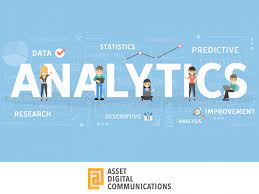The Power of Digital Marketing Analytics
In today’s fast-paced digital landscape, data is king. Understanding the performance of your digital marketing efforts is crucial to making informed decisions and driving success. This is where digital marketing analytics comes into play.
What is Digital Marketing Analytics?
Digital marketing analytics involves the collection, measurement, analysis, and interpretation of data related to your online marketing activities. By tracking key metrics such as website traffic, conversion rates, click-through rates, and customer engagement, you can gain valuable insights into the effectiveness of your campaigns.
The Benefits of Digital Marketing Analytics
**Data-Driven Decisions:** With digital marketing analytics, you can move away from guesswork and base your decisions on concrete data. This allows you to optimise your campaigns for better results.
**Improved ROI:** By understanding which strategies are working and which are not, you can allocate your budget more effectively to maximise return on investment.
**Audience Insights:** Analytics provides valuable information about your target audience’s behaviour, preferences, and demographics. This helps you tailor your marketing messages to resonate with your audience.
Key Metrics to Track
**Website Traffic:** Monitor the number of visitors to your website and track where they are coming from (e.g., organic search, social media, paid ads).
**Conversion Rates:** Measure the percentage of visitors who take a desired action on your site, such as making a purchase or signing up for a newsletter.
**Click-Through Rates (CTR):** Evaluate how many people click on your ads or links compared to the number of impressions they receive.
Implementing Digital Marketing Analytics
To harness the power of digital marketing analytics effectively, it’s essential to use tools such as Google Analytics, Adobe Analytics, or other specialised platforms. These tools allow you to track and analyse data in real-time and generate reports that provide actionable insights for your marketing strategy.
Conclusion
Digital marketing analytics is not just about numbers; it’s about understanding your audience and optimising your campaigns for success. By leveraging the insights gained from analytics, you can refine your strategies, boost engagement with customers, and ultimately drive growth for your business in the competitive digital landscape.
5.
- Why is digital marketing analytics important?
- What is the role of digital marketing analyst?
- What is an example of digital analytics?
- How data analytics is used in digital marketing?
- How is data analytics used in digital marketing?
- What are digital marketing analytics?
- Why MSC digital marketing and analytics?
Why is digital marketing analytics important?
Understanding the importance of digital marketing analytics is key to unlocking the full potential of your online marketing efforts. By leveraging data-driven insights, businesses can make informed decisions, optimise their strategies, and ultimately drive better results. Digital marketing analytics provides a clear picture of campaign performance, audience behaviour, and ROI, empowering organisations to allocate resources effectively and maximise their impact in the competitive digital landscape. In essence, digital marketing analytics is not just a tool for tracking metrics; it is a strategic asset that enables businesses to stay ahead of the curve and achieve sustainable growth in today’s data-driven world.
What is the role of digital marketing analyst?
The role of a digital marketing analyst is pivotal in the realm of online marketing. Digital marketing analysts are responsible for collecting, analysing, and interpreting data to provide valuable insights that drive strategic decision-making. They track key performance metrics, such as website traffic, conversion rates, and campaign effectiveness, to evaluate the success of digital marketing initiatives. By identifying trends, patterns, and opportunities within the data, digital marketing analysts help organisations optimise their campaigns, target the right audience segments, and ultimately achieve their business goals in the ever-evolving digital landscape.
What is an example of digital analytics?
An example of digital analytics is tracking the performance of an email marketing campaign. By using digital analytics tools, businesses can monitor metrics such as open rates, click-through rates, conversion rates, and subscriber engagement. This data provides valuable insights into the effectiveness of the email campaign, allowing marketers to make data-driven decisions to improve future campaigns and achieve better results.
How data analytics is used in digital marketing?
Data analytics plays a pivotal role in digital marketing by providing valuable insights into the performance and effectiveness of online campaigns. By utilising data analytics tools and techniques, digital marketers can track and measure key metrics such as website traffic, conversion rates, customer engagement, and ROI. This data-driven approach enables marketers to make informed decisions, optimise their strategies for better results, and tailor their messaging to resonate with their target audience. Ultimately, data analytics empowers digital marketers to enhance their campaigns, maximise their impact, and drive success in the ever-evolving digital landscape.
How is data analytics used in digital marketing?
Data analytics plays a pivotal role in digital marketing by providing valuable insights into the performance of online campaigns. By leveraging data analytics tools and techniques, digital marketers can track and measure key metrics such as website traffic, conversion rates, customer engagement, and ROI. This data-driven approach enables marketers to make informed decisions, optimise their strategies for better results, and tailor their messaging to resonate with their target audience. Ultimately, data analytics empowers digital marketers to enhance the effectiveness of their campaigns, drive growth for their businesses, and stay ahead in the competitive online landscape.
What are digital marketing analytics?
Digital marketing analytics refer to the systematic process of collecting, measuring, analysing, and interpreting data related to various online marketing activities. By utilising tools and techniques to track key metrics such as website traffic, conversion rates, click-through rates, and customer engagement, digital marketing analytics provide valuable insights into the performance and effectiveness of digital marketing campaigns. This data-driven approach enables businesses to make informed decisions, optimise their strategies for better results, and ultimately enhance their online presence and ROI in today’s competitive digital landscape.
Why MSC digital marketing and analytics?
When considering why MSC in Digital Marketing and Analytics is a compelling choice, it’s essential to recognise the program’s unique blend of theoretical knowledge and practical skills. This specialised course equips students with a deep understanding of digital marketing strategies and the analytical tools needed to interpret data effectively. By delving into topics such as consumer behaviour analysis, market trends, and campaign performance measurement, MSC in Digital Marketing and Analytics offers a comprehensive education that prepares graduates to excel in the dynamic field of digital marketing.




